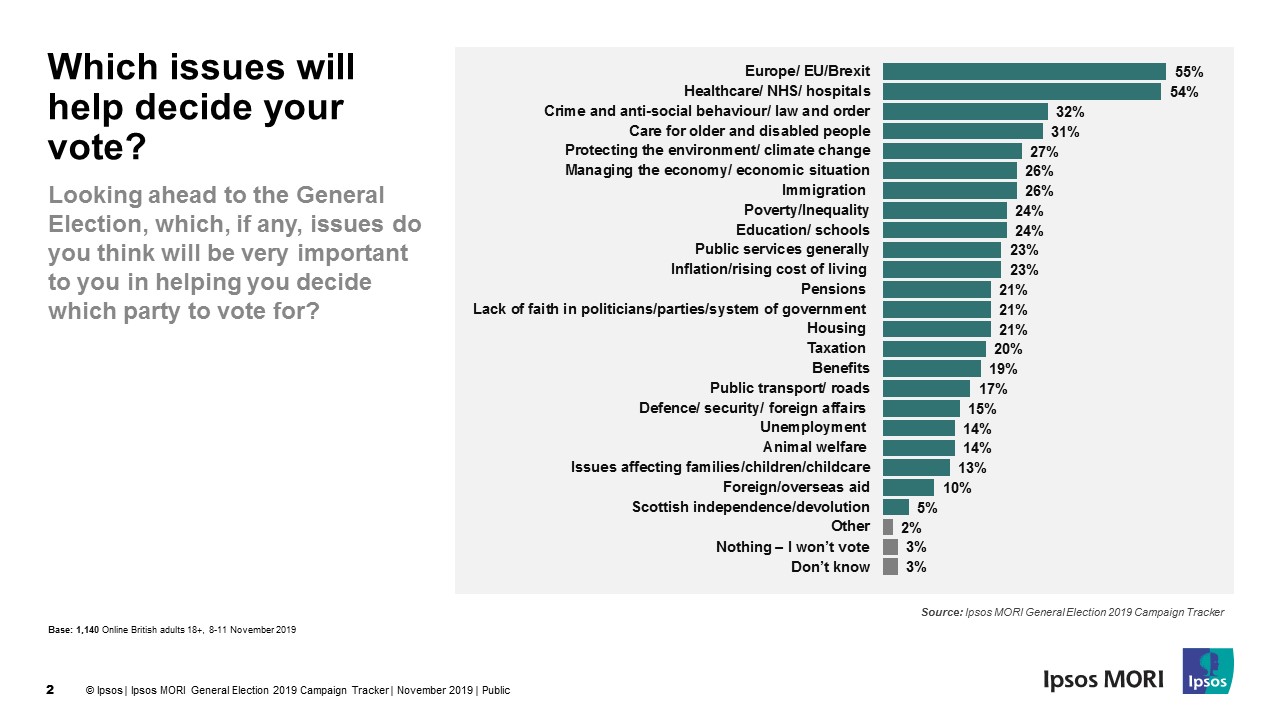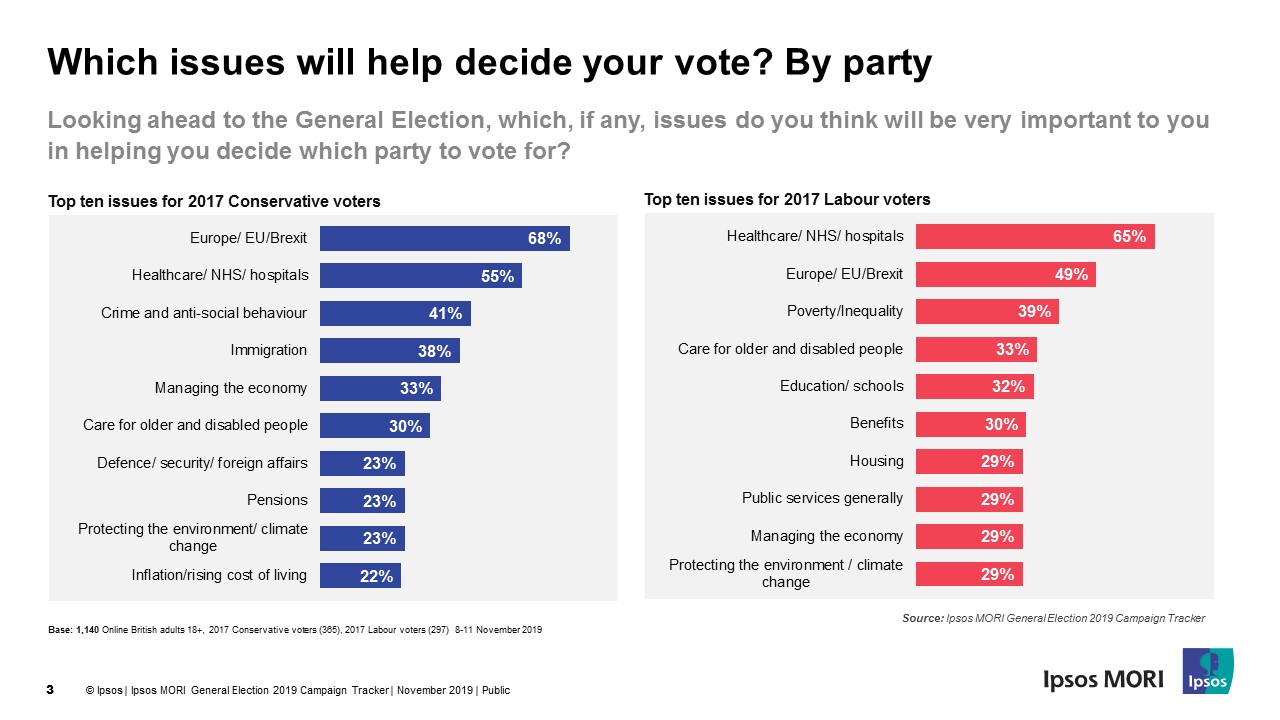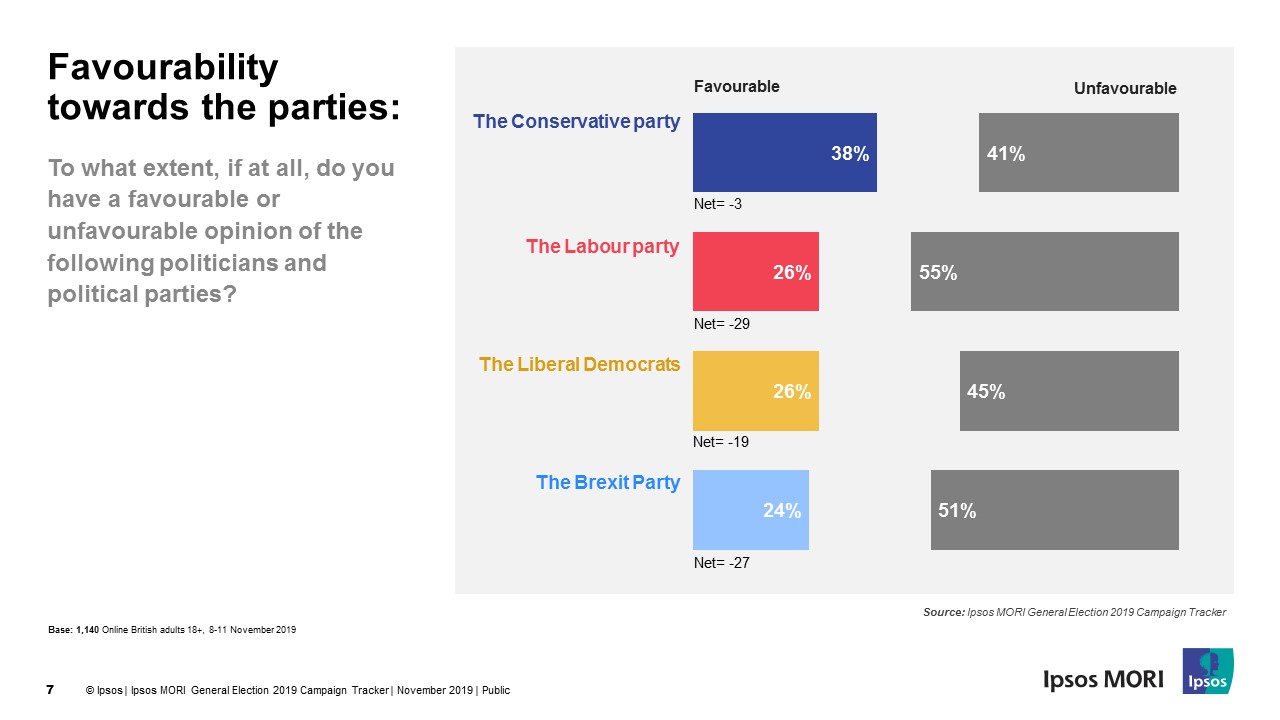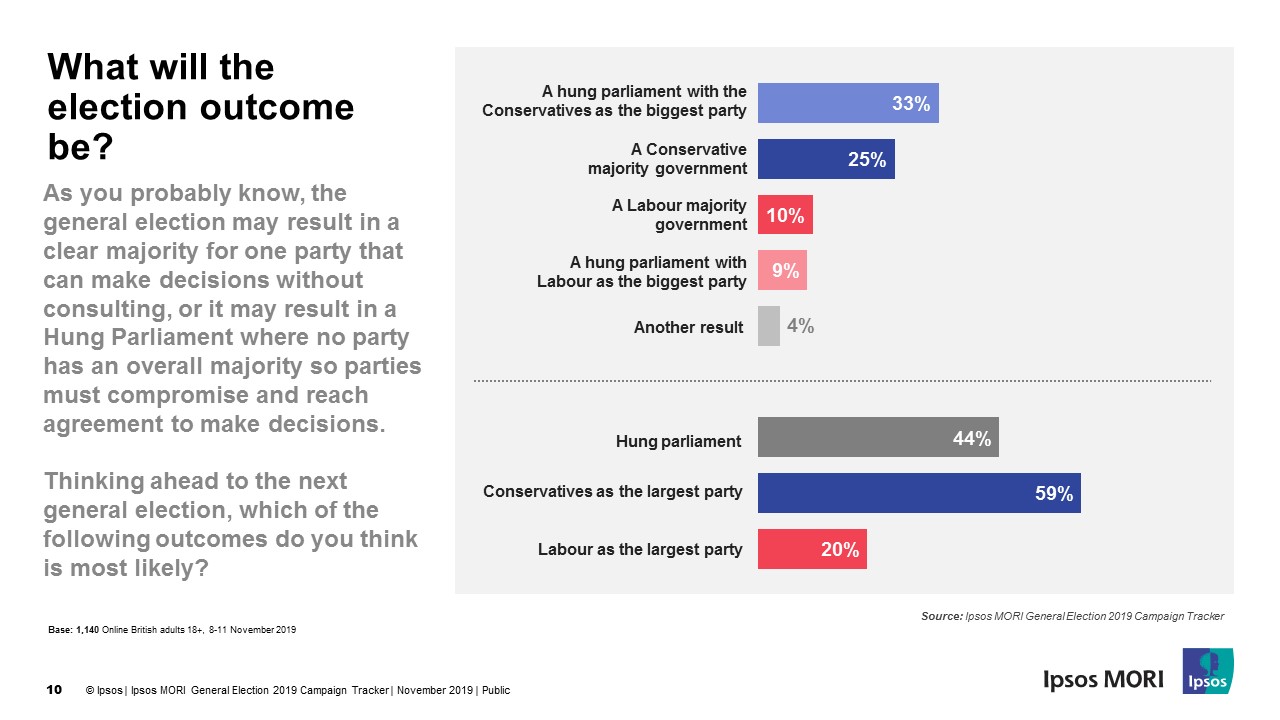Brexit and the NHS are the key issues for British adults
- Brexit and the NHS are the top two issues for British adults as they decide who to support – Conservative voters prioritise Brexit, Labour voters prioritise the NHS.
- British adults are more favourable towards the Conservatives than the Labour. Party. Remain voters are most favourable towards the Liberal Democrats, then Labour whilst Leave voters are most favourable towards the Conservatives.
- A majority (59%) expect the Conservatives to emerge from the election as the largest party – with 25% expecting a Conservative majority and 33% expecting a hung parliament with the Conservatives as the largest party.
Issues deciding your vote
- When asked which issues will be important in deciding how to vote the top two issues for GB adults are Brexit (55%) and the NHS (54%), which clearly lead crime and anti-social behaviour in third place (32%) and care for older and disabled people in fourth (31%). Beyond this there are many issues that matter to between one in four and one in five adults overall.

- For 2017 Conservative voters, the top four issues are Brexit (68%), the NHS (55%), crime and anti-social behaviour (41%) and immigration (38%).
- For 2017 Labour voters, the NHS is the number one issue (65%), followed by Brexit (49%) and poverty / inequality (39%).
- For Leave voters, Brexit is the number one issue (64%) followed by the NHS (55%), immigration and crime and anti-social behaviour (both 43%). However, for Remain voters the NHS is narrowly ahead of Brexit (61% vs 58%) with a range of other issues much further behind.
- When asked which party has the best policies on the issues that matter most to them, 26% of GB adults overall said the Conservatives, 19% said Labour, 12% said the Liberal Democrats, 8% said the Brexit Party and 3% said the Greens and SNP respectively. 1% said ‘another party’ without specifying. Meanwhile, 9% said different parties were better on different policies, 8% said ‘none of these’ and 10% said that they didn’t know.
- Remain voters were most likely to say that the Labour Party (28%) and Liberal Democrats (23%) had the best policies on the issues they cared about whereas Leave voters were most likely to say the Conservatives (45%).

Favourability to parties and their leaders
- 38% of GB adults have a favourable opinion of the Conservative Party, compared with 26% being favourable towards Labour and the Lib Dems and 24% being favourable towards the Brexit Party.
- In contrast, 41% have an unfavourable opinion of the Conservative Party compared with 55% that have an unfavourable opinion of Labour, 51% of the Brexit Party and 45% of the Lib Dems.
- Overall in terms of ‘net favourability’ the Conservatives lead on -3 with Lib Dems on -19, the Brexit Party on -27 and Labour on -29.
- Leave voters are most favourable towards the Conservatives (59%), compared to 45% for the Brexit Party, 14% for Labour and 10% for the Liberal Democrats.
- Remain voters are most favourable towards the Liberal Democrats (44%), then Labour (38%), the Conservatives (20%) and the Brexit Party (5%).

- Turning to party leaders, GB adults are most favourable towards Boris Johnson of the four party leaders included in the survey. 36% are favourable towards the PM, with 44% unfavourable, giving a net favourability score of -8. 58% of Leave voters are favourable towards Johnson.
- In contrast, of the four leaders, British adults are least favourable towards Jeremy Corbyn. 23% favourable, 62% unfavourable, net -39. A majority of Remain voters (53%) are unfavourable towards Corbyn.
- 24% are favourable towards Lib Dem leader Jo Swinson, 44% unfavourable, net -20.
- 24% are favourable towards Brexit Party leader Nigel Farage, 54% unfavourable, net -30.
Who is having a good campaign?
British adults are more likely to think each of the Conservatives, Labour, Liberal Democrats and the Brexit Party are having a bad campaign than having a good campaign.
- 27% think the Conservatives are having a good campaign, 35% say a bad campaign. Net -8.
- In contrast, British adults are more than twice as likely to say that Labour are having a bad campaign (44%) rather than having a good one (21%). Net -23.
- 23% think the Lib Dems are having a good campaign and 33% think they are having a bad campaign. Net -10.
- 19% think the Brexit Party are having a good campaign, 36% a bad campaign. Net -17.
What will the election outcome be?
- When asked what the expect the election result to be a majority (59%) expect the Conservatives to be the largest party with 25% expecting a Conservative majority and 33% expecting a hung parliament with the Conservatives as the biggest party.¹ 83% of 2017 Conservative voters expect the party to be the largest party after the election – either as a majority government or in a hung parliament.
- In contrast, one in five British adults (20%) expect Labour to be the largest party with 10% predicting a majority Labour government and 9% a hung parliament with Labour as the largest party.² In contrast to 2017 Conservative supporters, fewer than half (47%) of 2017 Labour voters expect the party to be the largest party after the election – either in a hung parliament or as a majority Labour government.
- 4% think there will be another result such as a Lib Dem majority (1%), a hung parliament with the Lib Dems as the largest party (1%), a hung parliament with the Brexit Party as the largest party (1%) or a Brexit Party majority (1%).

Commenting on the findings, Ipsos Research Director Keiran Pedley said:
The Conservatives enter the campaign in a good position, ahead in voting intention polls and leading on favourability and having a ‘good campaign’ so far. Meanwhile, a majority of the public expect them to emerge from the election as the largest party – either as a majority government or in a hung parliament. However, there are still several weeks to go in a campaign likely to be dominated by Brexit and the NHS, at least in the short term, so things can change. For Labour, it will be a concern that Remain voters feel more favourable towards the Liberal Democrats than Labour, although there are some signs in voting intention polling that the Lib Dem vote share is already starting to be squeezed by Labour regardless.
Technical note
Ipsos interviewed a representative sample of 1,140 British adults. Interviews were conducted online: 8th – 11th November 2019. Data are weighted to match the profile of the population. All polls are subject to a wide range of potential sources of error.
¹Note – 25% expecting Conservative majority and 33% expecting them to be the largest party in a hung parliament sum to 59% due to rounding.
²Note – 10% expecting a Labour majority and 9% expecting Labour to be the largest party in a hung parliament sum to 20% due to rounding.






